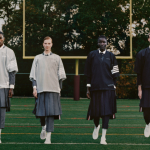
Narrating Japanese football: SHUKYU magazine
The best football magazine in Japan opens about the football culture on that side of the Ocean with an exclusive interview
Shukyu is a Japanese magazine that want to tell the Japanese football culture from a different point of view. We reached Takashi Ogami, its founder in order to know more about it.
First of all, I’d like to know how the idea of a magazine about football culture was born?
Most football magazines in Japan only provide game results and transfer news. You can easily get this information online, and I didn’t particularly find those magazines interesting. That’s where I started feeling the urge to propose new and alternative ways to enjoy football.
Why did you choose to focus every issue on a specific topic?
I want to express the multifaceted part of football and setting the theme makes the section of contents clearer. Based on the theme, I think that it is one of SHUKYU's personality that constitutes pages with various contents.
In your magazine, you balance perfectly article about Japanese football with the ones comes from Europe. I actually agree on this choice but I’d like to ask you how did you decide the stories to follow.
I would like to introduce Japanese football culture to overseas people, and also want to introduce Japanese football culture to overseas people, I have these two feelings, so I try not to be biased toward either. Also, how to enjoy football is equal regardless of famous or unnamed. SHUKYU covers similar things from major players to independent players.

Often we (I mean in Europe) look at Japan as something and somewhere of really distant and far. Could you tell me something more about the level of football culture in Japanese society?
The Japan Professional Football League launched in 1993. Football grew its status among Japanese people when the national team joined the FIFA World Cup. Baseball used to be more popular than football, but it’s opposite now. The domestic football league scene is not quite big while the national football team wins large popularity. Japanese followers tend to give most of their attention to European leagues as many of the Japanese national team members play in teams there. I think the media is responsible for this tendency in some ways.
Also, many people play futsal in urban areas. Whereas it’s not very easy to find football grounds in Tokyo, there are a number of accessible futsal grounds here. The one on the top of the department store by the Shibuya station is quite famous, I guess? I myself play there every now and then. You can easily play futsal with a smaller number of players compared to football. I think that’s why it’s popular here.
How important could be the spread of football culture to also evolve the level of Japanese football?
Since it is a sport, it can not be helped that popularity concentrates on a strong team. However, I think that knowing the football culture is very important in knowing the attractiveness of each team that is not only strong. By doing so, I think that Japan will lead to a rise in football itself, resulting in a higher level.
![]()
In your last issue there’s a wonderful editorial about female football, which is something that is attracting more and more interest. What is the situation in Japan?

As the Japan won the FIFA Women's World Cup as the Asian country, the attention degree of women's football dramatically increased in Japan. I think that women's football players are increasing year by year. Even though it is said that the size is still small compared to men’s, so I think that it is time to come. Also, because you can play futsal casually, there are many opportunities for men and women to play together.
In an era where the newspaper are disappearing, what push a magazine like yours to print instead of goes online?
The main reason is simply that I grew up watching a magazine. I think that the role of the magazine is changing compared to those days, but on the contrary it is believed that there is also something that can be done now. Also, since online speed is fast, we can not manage it very much with small media like us.

What’s your biggest hope about future?
I want to make a place. I have managed a gallery space, so importance of place in making culture I feel it a lot. Although I only want the place where they can see football casually.
Could you describe your last event? Are you satisfied by the result achieve in terms of people and interest around it?
It was our first challenge, but there were new encounters by actually doing the event, and it was a very meaningful event. I will talk about it in Seoul the next time. I would like to excite football culture not only in Japan but also in Asia.














